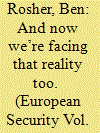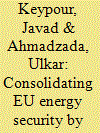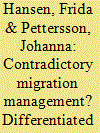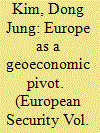|
|
|
Sort Order |
|
|
|
Items / Page
|
|
|
|
|
|
|
| Srl | Item |
| 1 |
ID:
186196


|
|
|
|
|
| Summary/Abstract |
Though conspicuous by its absence in debates among the British political and media establishments during the EU referendum campaign, the Irish border has been the central feature of Brexit as the implications and complications of trying to “take back control of borders” have become apparent. Drawing on focus group data gathered between 2017 and 2019 I employ ontological security theory to investigate the impact that Brexit is having on residents and communities living in the central Irish border region. In particular, I draw on the work of David Carr to explore the social role of memory and narrative in ontological (in)security and how this has manifested in the border region throughout the Brexit process. I find that the uncertainties generated by Brexit have caused border residents to draw on anxiety-filled memories and narratives from the securitised border of the pre-Good Friday Agreement era which they then project onto and vicariously through the next generation who, in turn, embody these anxieties, creating intergenerational ontological insecurity. Brexit has reintroduced, if not the physical border, the psychological borders of the past.
|
|
|
|
|
|
|
|
|
|
|
|
|
|
|
|
| 2 |
ID:
186202


|
|
|
|
|
| Summary/Abstract |
Aiming to protect energy security, the European Union (EU) has sought to persuade third states to accept its energy acquis, relying on a formed strategic narrative. However, the coherency of this strategic narrative, as the prerequisite for being well-received, has not been studied before. Considering the strategic narrative theory and applying the content analysis method, our research has indicated that the EU’s narrative consists of five storylines, including geopolitics, the single energy market, and climate change, the last two of which have become increasingly accentuated over time. However, this strategic narrative suffers from two significant incoherencies, which lie between its storylines and also within the storyline. The results of our analyses indicate that both incoherencies originate from the securitisation of energy in the Union. This means that the effectiveness of the narrative formulated has been diminished, which is detrimental even to the EU’s climate policy. This could suggest that de-politicisation of energy is required to reinforce the narrative and enable the EU to address the world with one voice.
|
|
|
|
|
|
|
|
|
|
|
|
|
|
|
|
| 3 |
ID:
186201


|
|
|
|
|
| Summary/Abstract |
While the construction of migration as a security threat in Europe has been thoroughly examined, how different groups of migrants become targets of security concerns has not received similar attention. In its fight against irregular immigration, the European Union uses visa liberalisation agreements with neighbouring states as an incentive for cooperation on migration control. At a first glance, this strategy appears somewhat contradictory, as visa liberalisation potentially increases the share of visa overstayers among irregular migrants. Through analysis of the annual “Risk Analysis” reports between 2015 and 2020 published by EU’s border and migration management agency, FRONTEX, this article shows that visa overstay is routinely left out of the agency’s security concerns of irregular migration, thus rendering risk assessments asymmetrically occupied with irregular migration by means of “illegal entry”. Although visa overstayers are not conceptualised as threats to security in discourse on par with other categories of irregular migrants, we find that they are increasingly subjected to a rationale of surveillance and risk.
|
|
|
|
|
|
|
|
|
|
|
|
|
|
|
|
| 4 |
ID:
186200


|
|
|
|
|
| Summary/Abstract |
Intensifying strategic competition with China has introduced the need for the United States to consider extensive and stringent economic restrictions against the rising power. This article suggests that US economic containment of China is unlikely to materialise due to the presence of the EU states that are not militarily threatened by the geographically separated China and in a position to prioritise economic benefits in exchanges with that state. It first identifies the role of the EU in China’s foreign economic exchanges and addresses the ability of the EU states to replace the economic function of the United States in China. Then, it discusses how geographical conditions surrounding China make the rising state largely an East Asian threat. It suggests that, devoid of any direct military threat from China, the EU states can undermine the effectiveness of substantial US economic containment measures against China by functioning as alternative economic partners or facilitating China’s construction of alternative economic routes. Finally, this paper discusses the limitations in US ability to constrain the EU states’ economic exchanges with China. While concerns grow over Washington’s economic assertiveness against Beijing, the feasibility of a US-led upheaval in economic relations involving China should be carefully gauged.
|
|
|
|
|
|
|
|
|
|
|
|
|
|
|
|
| 5 |
ID:
186197


|
|
|
|
|
| Summary/Abstract |
In the triangle of relations between major EU powers, the relationship between Germany and the UK remains historically under-examined. Its implications for the future of European defence cooperation are, however, vital and gradually more decisive. The article examines indices on the direction of this relationship to model the shape and impact of this missing link among the more thoroughly investigated relations of Germany-France and UK-France. As both the UK and Germany were forced to formulate clear positions during the Brexit process, their pronounced interactions offer a unique insight into the development of their bilateral defence cooperation, both present and future, and its impact on multilateral UK-EU defence relations. The central question that arises is whether sufficient progress has been made towards a stronger bilateral defence relationship between these two actors to warrant the designation of a trend towards new bilateralism. The article explores this within three major sectors: (1) official defence cooperation; (2) military cooperation; (3) defence industrial cooperation and finds that overtures and initiatives launched in the examined period are insufficient to alter the relationship toward new bilateralism.
|
|
|
|
|
|
|
|
|
|
|
|
|
|
|
|
| 6 |
ID:
186195


|
|
|
|
|
| Summary/Abstract |
Recent analysis has interpreted Russia’s approach to the EU-led dialogue between Kosovo and Serbia through the lens of its actions in Ukraine. This has been characterised as “hybrid warfare” designed to disrupt the negotiations to prevent the integration of the Balkans into Western institutions. This article examines whether Russian actions in Ukraine have signalled a recalibration of Russia’s response to the Kosovo issue based on a repudiation of the EU-led dialogue. This article argues that while Russia’s behaviour has been shaped by its growing competition with the Western powers, its approach has been ambiguous and driven by a range of humanitarian, legal and security-based arguments rooted in the context of the Kosovo problem. These arguments have emerged as important trends in Russia’s behaviour and can be traced to its response to the Kosovo conflict in 1999. This article shows that there has not been a complete recalibration in Russia’s policy towards the dialogue. Russia’s approach has shown both continuity with these trends and a growing politicisation accelerated by the sharp decline in Russia’s relations with the West since 2014. In a broader sense, this article questions the intent and form of Russia’s actions in Ukraine as an explanatory framework for Russia’s behaviour elsewhere.
|
|
|
|
|
|
|
|
|
|
|
|
|
|
|
|
| 7 |
ID:
186198


|
|
|
|
|
| Summary/Abstract |
The European Defence Technological and Industrial Base (EDTIB) is considered as a key element in the quest for a European Security and Defence Union. The EDTIB strategy initiated in 2007 aimed to lead to greater integration of the fragmented national defence industries of EU member-states, achieve economies through the coordination of defence industrial policy, the pooling of resources in the production and acquisition of weapons systems and better serve the political objectives of European defence. The paper examines the extent to which EU27 member-states satisfy their demand for arms through the procurement of EDTIB origin defence inputs. Moreover, it explores whether a process of convergence is present in terms of the share of EDTIB origin imports in the total arms imports of the EU member-states. The presence or not of a convergence process is examined empirically using β- and club convergence methodologies. In broad terms, the findings point to a process of convergence albeit at different speeds, as indicated by the club-convergence analysis.
|
|
|
|
|
|
|
|
|
|
|
|
|
|
|
|
| 8 |
ID:
186199


|
|
|
|
|
| Summary/Abstract |
While a comprehensive body of research provides evidence that politics does not always stop at the water’s edge, the question “when does politics stop at the water’s edge” has remained largely unanswered. This article addresses this gap in the literature by examining the level of agreement in Belgium’s parliament on military deployment decisions. More specifically, the uncontested decisions to participate in the 2011 Libya intervention and the air strikes against the self-proclaimed Islamic State in Iraq are compared with the contested decision to participate in strike operations against IS over Syrian territory. The results of our study indicate that a broad parliamentary consensus will emerge if the domestic political context forces left- and right-leaning parties into negotiating a compromise that takes into account their preferences regarding the scope of the operation and if left-leaning parties have no reason to oppose the operation because it pursues inclusive goals and its international legal justification is not contested.
|
|
|
|
|
|
|
|
|
|
|
|
|
|
|
|
|
|
|
|
|